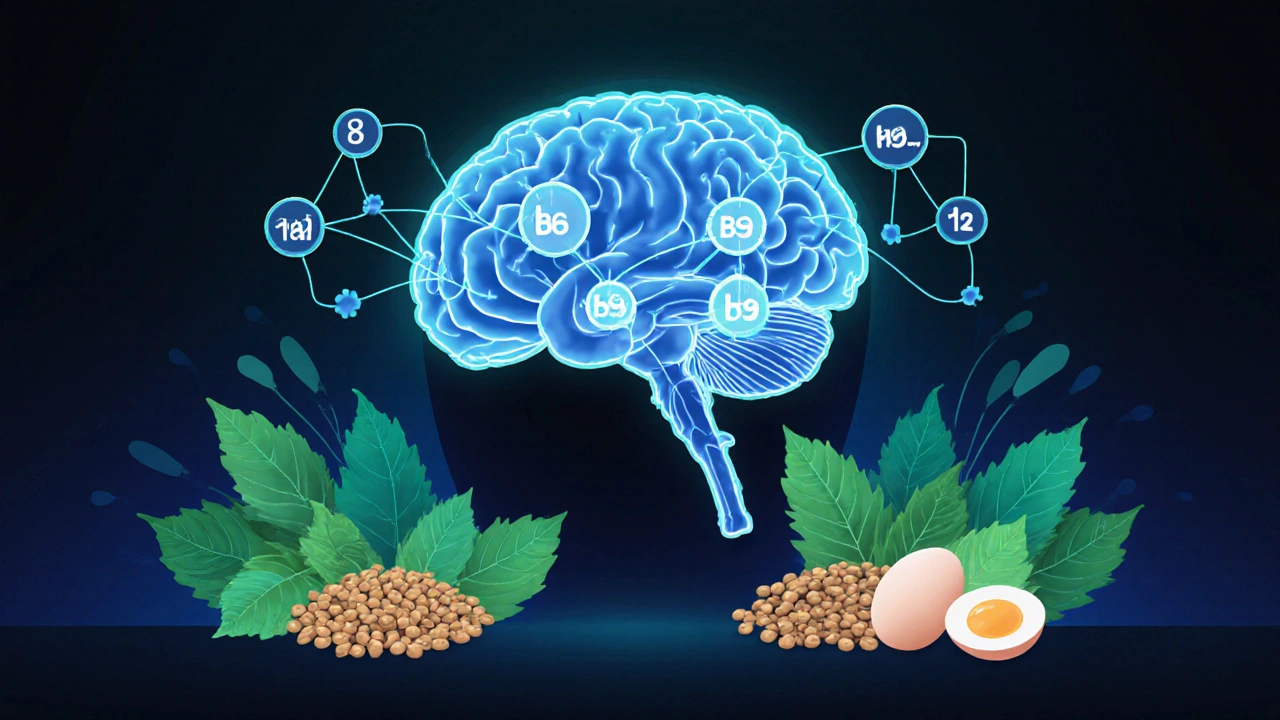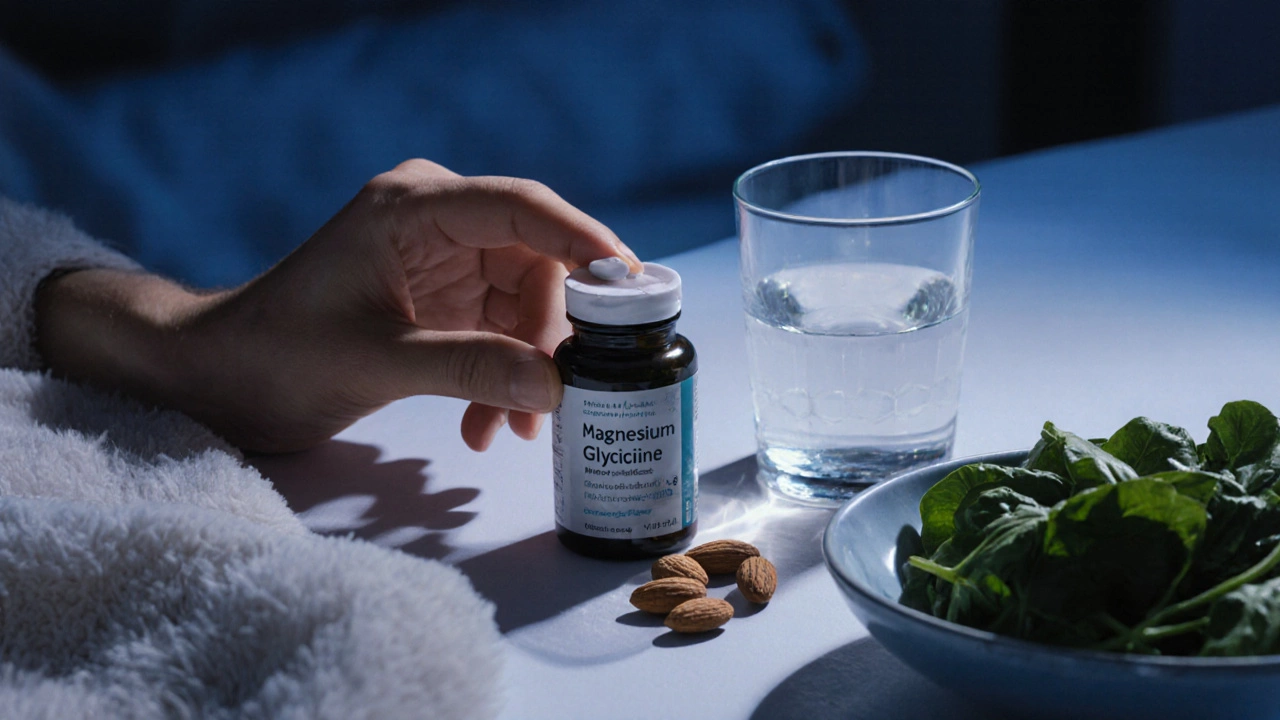Mood Support Vitamin Calculator
Your Mood Support Tool
This calculator helps identify which mood-supporting vitamins might be most beneficial for you based on your symptoms and lifestyle factors. Remember: supplements work best when combined with proper nutrition, stress management, and medical guidance.
Symptom Assessment
Check the symptoms you're experiencing:
Lifestyle Factors
Recommended Supplements
Important Note: These recommendations are based on general information about mood-supporting vitamins. Always consult with a healthcare professional before starting any new supplement regimen, especially if you have existing health conditions or are taking medications.
If you’ve ever felt like your emotions are on a rollercoaster-suddenly irritable one minute, tearful the next, or just flat out drained-you’re not alone. Mood swings can hit hard, especially when they show up without warning and mess with your sleep, relationships, or focus. While stress and sleep deprivation play big roles, one often overlooked piece of the puzzle is your nutrition. Specifically, certain vitamins and minerals act like quiet regulators in your brain, helping to smooth out the emotional spikes and crashes. The question isn’t just what vitamin for mood swings works-it’s which ones actually have solid evidence behind them, and how much you really need.
Vitamin D: The sunshine vitamin your brain is begging for
Vitamin D isn’t just for bones. It’s a hormone precursor, meaning your body uses it to make chemicals that affect your mood. Low levels of vitamin D are strongly linked to seasonal depression, irritability, and feelings of hopelessness. A 2023 meta-analysis of over 12,000 adults found that people with the lowest vitamin D levels were 2.5 times more likely to report frequent mood swings than those with sufficient levels. This isn’t just correlation-it’s biological. Vitamin D receptors are found in the hypothalamus and hippocampus, the brain’s emotional control centers.
Most people don’t get enough, especially in winter or if they work indoors. The recommended daily amount is 600-800 IU, but many experts suggest 1,000-2,000 IU for those with mood issues. Blood tests show optimal levels are between 40-60 ng/mL. If your levels are below 30, supplementation can make a noticeable difference in as little as 6-8 weeks. Sunlight helps, but if you live north of Atlanta or spend most days inside, you’re probably deficient-even if you think you’re getting enough.
B vitamins: Your brain’s energy and neurotransmitter factory
Think of B vitamins as the mechanics behind your brain’s chemical factory. They help turn food into energy and build neurotransmitters like serotonin, dopamine, and GABA-all of which directly influence how calm, focused, or anxious you feel. The big three for mood are B6, B9 (folate), and B12.
B6 is critical for making serotonin and dopamine. A 2022 study in the Journal of Affective Disorders showed that adults taking 50 mg of B6 daily for a month reported significantly less anxiety and stress compared to placebo. B12 deficiency is more common than you think-especially in vegetarians, older adults, or people on acid-reducing meds. Low B12 can mimic depression: fatigue, brain fog, emotional numbness. The recommended dose is 2.4 mcg daily, but if you’re deficient, 1,000 mcg sublingual tablets can restore levels quickly.
Folate (B9) is even more important. People with depression often have low folate levels. The active form, methylfolate, crosses the blood-brain barrier better than folic acid. In clinical trials, adding 15 mg of methylfolate to antidepressants improved response rates by nearly 50%. You can get folate from leafy greens, lentils, and avocado-but if your mood is unstable, supplementation often makes the difference.
Magnesium: The natural calm-down mineral
Magnesium is the unsung hero of emotional balance. It helps regulate the HPA axis-the body’s stress response system. When you’re stressed, your body uses up magnesium fast. Low magnesium means your nervous system stays stuck in “fight or flight,” making you more reactive, anxious, and prone to emotional outbursts.
A 2021 randomized trial published in PLoS One gave 300 mg of magnesium citrate daily to adults with mild-to-moderate anxiety and depression. After 6 weeks, 80% reported improved mood, less irritability, and better sleep. Magnesium glycinate is the best form for mood-it’s gentle on the stomach and easily absorbed. Food sources like almonds, spinach, and black beans help, but most people don’t eat enough to reach therapeutic levels. If you get muscle cramps, trouble sleeping, or feel constantly on edge, magnesium is likely missing from your routine.

Vitamin C and E: The quiet protectors
Chronic stress creates oxidative damage in the brain. That’s where antioxidants come in. Vitamin C and E don’t directly boost serotonin, but they protect brain cells from the wear and tear of stress hormones like cortisol. A 2020 study in Nutritional Neuroscience found that people who took 1,000 mg of vitamin C daily for 14 days showed lower cortisol levels and reported feeling less mentally drained.
Vitamin E works alongside vitamin C to stabilize cell membranes in the brain. You’ll find it in nuts, seeds, and vegetable oils. Most people get enough from diet, but if you’re under constant stress, your body burns through antioxidants faster. Supplementing isn’t usually needed unless you’re severely deficient-but pairing it with magnesium and B vitamins creates a powerful protective shield.
What to avoid: Supplements that promise too much
The supplement aisle is full of products claiming to “fix your mood” with one pill. Many of them contain unregulated herbs, excessive doses, or ingredients that interact dangerously with medications. St. John’s Wort, for example, can interfere with birth control, SSRIs, and blood thinners. 5-HTP can cause serotonin syndrome if taken with antidepressants. L-theanine is safe and calming, but it’s not a replacement for real nutrient deficiencies.
Don’t fall for “mood booster” blends that list 15 ingredients with no clear dosages. Stick to single nutrients with proven research: vitamin D, B-complex, magnesium, and maybe vitamin C. Quality matters too-look for third-party tested brands like Thorne, Pure Encapsulations, or Life Extension. Avoid gummies-they’re loaded with sugar and often contain less than the label claims.

How to start: A simple 3-step plan
- Get a blood test. Check vitamin D, B12, and folate levels. If you’re over 40 or have digestive issues, test magnesium too. Don’t guess-know your numbers.
- Start with the basics: 2,000 IU of vitamin D3 daily, a B-complex with methylfolate and B12 (at least 50 mg B6, 800 mcg B12), and 300 mg magnesium glycinate at night.
- Wait 6-8 weeks. Track your mood in a journal. Note energy, sleep, irritability, and emotional resilience. If you feel calmer, more grounded, and less reactive-you’re on the right track.
Don’t expect miracles overnight. These aren’t drugs-they’re foundational nutrients. They work slowly, like fixing the foundation of a house. But once they’re in place, your mood becomes more stable, not because you’re suppressing feelings, but because your brain finally has what it needs to function properly.
When to see a doctor
Supplements help, but they’re not a cure-all. If your mood swings are severe, include panic attacks, suicidal thoughts, or last longer than two weeks, see a mental health professional. Mood swings can be a sign of bipolar disorder, thyroid issues, or hormonal imbalances-all of which need medical evaluation. Blood tests can rule out thyroid dysfunction (TSH, free T3, free T4) and low testosterone or estrogen, which also trigger emotional instability.
Also, if you’re on any medication-especially antidepressants, birth control, or blood pressure drugs-talk to your doctor before starting new supplements. Interactions happen, and safety comes first.
Bottom line: Your mood isn’t broken. It’s undernourished. The right vitamins won’t make you happy all the time-but they’ll give your brain the tools to handle stress, bounce back faster, and stay steady through life’s ups and downs.
Can vitamin D really fix mood swings?
Yes, for many people. Low vitamin D is one of the most common nutritional causes of mood instability, especially in winter or with limited sun exposure. Studies show supplementing with 1,000-2,000 IU daily can significantly reduce irritability, sadness, and emotional fatigue within 6-8 weeks. But it works best when combined with other key nutrients like B vitamins and magnesium.
Is magnesium better than antidepressants for mood swings?
No-magnesium isn’t a replacement for prescribed antidepressants. But for mild-to-moderate mood swings caused by stress or deficiency, magnesium glycinate can be as effective as low-dose SSRIs for some people, with fewer side effects. It’s best used as a supportive tool, not a substitute. Always consult a doctor before stopping or changing medication.
How long does it take for vitamins to improve mood?
It varies. Vitamin D and magnesium often show results in 4-6 weeks. B vitamins can take 6-8 weeks, especially if you’re deficient. Unlike medications that alter brain chemistry quickly, vitamins rebuild your brain’s foundation. Patience is key. Track your symptoms daily to notice subtle shifts.
Can I get enough of these vitamins from food alone?
It’s possible-but unlikely for most people. You’d need to eat 3 cups of spinach daily for magnesium, 3 servings of fatty fish for vitamin D, and large amounts of liver or fortified foods for B12. Modern diets, soil depletion, and stress make it hard to meet therapeutic levels through food alone. Supplementation fills the gap, especially if you’re already struggling with mood issues.
Do B12 injections work better than pills for mood?
Only if you have a condition like pernicious anemia or severe malabsorption. For most people, high-dose sublingual B12 (1,000 mcg) works just as well as injections and is far cheaper. Injections offer no extra benefit for mood unless your body can’t absorb B12 from the gut.
Next steps: What to do today
Don’t wait for a perfect plan. Start small. Order a home blood test kit for vitamin D and B12-many are covered by insurance. Pick one supplement to try: either magnesium glycinate or vitamin D3. Take it daily for 6 weeks. Write down how you feel each morning. If your mood feels steadier, you’ve found your missing piece. If not, you’ll know it’s time to dig deeper-with a doctor, a dietitian, or both.






